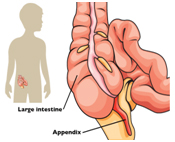Appendicitis, perforated
What is a perforated appendicitis?
Appendicitis (ah-pen-dih-site-iss) is inflammation of the appendix, a small worm-shaped structure that's attached to the large intestine in the lower right side of the abdomen (see picture). If the opening to the appendix gets blocked by some material from the intestine, it becomes irritated, swollen, and infected.
Sometimes an infection of the appendix can cause a hole that allows the infection to spread to the rest of the abdomen. This is called a "perforated" or "ruptured" appendicitis.

How is it treated?
The treatment for appendicitis begins with hydration and antibiotics. When stable, the appendix may be surgically removed in order to prevent the infection from returning. If a hole is found in the appendix during surgery, your child will require further antibiotics in order to prevent another infection from occurring.
What happens in the hospital?
All children with perforated appendicitis will remain in the hospital for at least 3 days to receive antibiotics after the surgery.
What else do I need to know?
Sometimes the intestines go to sleep as a result of the infection in the abdomen. This is called an ileus. A nasogastric (NG) tube (small tube that goes into the stomach through the nose) may be used to prevent vomiting and keep your child comfortable. If the intestines remain asleep and your child cannot take liquids for seven days or more after the surgery, a peripherally inserted central venous catheter (PICC) is placed for intravenous (IV) nutrition.
After surgery, because of the infection, some children will have diarrhea and/or pain with urination. Both of these are normal and will improve as the infection resolves.
If your child is still in the hospital 7 days after the surgery, an ultrasound or a CT scan will be done to look for another infection. These tests cannot be done earlier because the infection will not be seen well enough. If the tests show another infection, it will be treated with more IV antibiotics or a drain will be placed by the radiology health care practitioner, or both.
When will my child be discharged?
Your child may be discharged from the hospital when:
- There is no fever for 24 hours;
- Eating and drinking enough to stay hydrated;
- Pain controlled with medicines taken by mouth
What will be my child’s recovery at home?
- No tub bathing or swimming for 7 days. It is ok to shower and let water run over the dressing/incision.
- Children usually go back to school within 7-10 days after discharge.
- Gym and sports may be resumed in 2 weeks.
- Schedule a post-op appointment to be seen by the surgeon. Your health care practitioner will let you know when to come back.
When should I call the health care practitioner?
- Fever (temperature over 101° F)
- Abdominal pain
- Nausea/vomiting
- Diarrhea
- Wound infection (redness, swelling, drainage, tenderness)
Last reviewed 1/2016
This page is not specific to your child, but provides general information on the topic above. If you have any questions, please call your clinic. For more reading material about this and other health topics, please call or visit Children's Minnesota Family Resource Center library, or visit www.childrensmn.org/educationmaterials.
© 2024 Children's Minnesota
